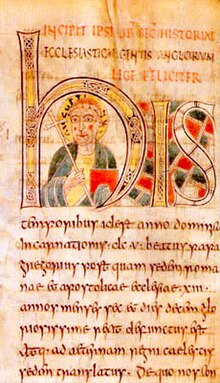 |
| Codex Amiatinus depiction of Ezra, produced at Wearmouth-Jarrow in Bede's time |
St Bede, I have to say, is currently my favourite saint.
Back in the day, Blessed Cardinal Newman wrote that 'Bede is truly the pattern of a Benedictine as is St Thomas of a Dominican'. Today's Matins reading nicely sets out just why this is:
Bede the priest was born at Jarrow, on the borders of England and Scotland. When a monk, he so arranged his life as to devote himself completely to the study of the liberal arts and sacred doctrine, without in any way relaxing the discipline of the Rule. There was no kind of learning in which he was not thoroughly versed; but his special interest was the study of the Scriptures; and when he was made a priest, he undertook the task of explaining the holy books. In doing so, he adhered to the teaching of the holy Fathers so closely that he would say nothing not already approved by their judgment, and he even made use of their very words. Abhorring laziness, he would go straight from reading to prayer and from prayer to reading. To raise the level of morality among Christians and to defend and spread the faith, he wrote many books, which gained him such a reputation with everyone that his writings were publicly read in churches during his own lifetime. At length, worn out with age and labours, he fell asleep peacefully in the Lord. Leo XIII declared him a Doctor of the universal Church.Although Bede's history of the English Church has long been available and appreciated, along with some of his lives of the saints, his output was actually much broader than this, including scientific works, guides to the holy lands, and a number of exegetical works. English translations of his exegetical works are still only gradually becoming available, and this is leading to a new appreciation of Bede's originality: though he certainly drew heavily on the Fathers in his work, he was very much concerned with the politics of both church and state of his time, and his exegetical works in particular reflect this.
But for me at least, the most startling aspect of his work, though one not always acknowledged in modern translations of and commentary on his works (the exemplary work and valiant efforts of Scott DeGregorio aside) due to some typical 1970s revisionism, is the degree to which the Rule shaped his mindset.
Allusions to the Rule are scattered throughout his writings to the point where one can pretty much construct a commentary on the Rule from them (the Homilies alone for example include references to 50/73 tools of good works and 33 chapters of the Rule), and indeed even his use of Scriptural quotes frequently reflect's St Benedict use of the relevant text. And while I've seen several theories advanced for the selection of the books of the Bible that he focused on, I haven't seen anyone as yet note what seem to me to be the obvious links between many of the texts he chose and his key themes (such as the Temple and Tabernacle) and the Rule...
Regardless, St Bede is an important saint well worth learning more about: a saint who lived a good life; provided us with a great legacy of his learning; and who also died a particularly holy death, which you can read about in this great post from A Clerk of Oxford.

